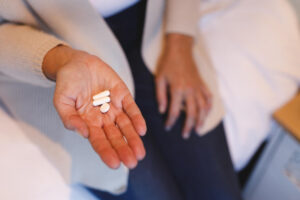Understanding Low Testosterone in Men
Low testosterone, commonly referred to as “low T,” is a condition that affects a significant number of men, particularly as they age. Testosterone is the primary male sex hormone produced by the testicles and is responsible for a variety of essential functions in the male body. These functions include maintaining muscle mass, bone density, libido (sex drive), mood, and energy levels. When testosterone levels drop below the normal range, men may experience a variety of symptoms that can significantly impact their quality of life.
The Role of Testosterone in Men’s Health
Testosterone is not just about sex drive and physical characteristics like muscle mass and facial hair; it plays a critical role in many aspects of men’s health. Here’s a closer look at some of the key functions of testosterone:
- Muscle Mass and Strength: Testosterone is essential for building and maintaining muscle mass and strength. Men with low testosterone levels may notice a decrease in muscle mass and find it more challenging to gain muscle even with regular exercise.
- Bone Density: Testosterone contributes to bone density and strength. Low levels of testosterone can lead to thinning bones (osteoporosis), increasing the risk of fractures.
- Sex Drive and Erectile Function: Testosterone is a key driver of libido and plays a role in erectile function. Men with low testosterone often experience a reduced sex drive and may struggle with erectile dysfunction.
- Mood and Mental Health: Testosterone influences mood and mental well-being. Low levels of testosterone have been linked to feelings of depression, irritability, and a lack of motivation.
- Energy Levels: Testosterone contributes to overall energy levels. Men with low testosterone may feel fatigued and experience a general lack of energy.
- Cognitive Function: Testosterone impacts cognitive functions such as memory and concentration. Some men with low testosterone report issues with memory or mental clarity.
Causes of Low Testosterone
Low testosterone can be caused by a variety of factors, including aging, medical conditions, lifestyle choices, and even environmental factors. Some common causes include:
- Aging: Testosterone levels naturally decline with age. After the age of 30, testosterone levels typically decrease by about 1% per year.
- Hypogonadism: This is a medical condition where the testicles produce little or no testosterone. It can be congenital or acquired later in life due to injury or illness.
- Chronic Health Conditions: Conditions such as type 2 diabetes, obesity, metabolic syndrome, and chronic stress can contribute to low testosterone levels.
- Medications: Certain medications, including opioids, steroids, and some antidepressants, can lower testosterone levels.
- Lifestyle Factors: Poor diet, lack of exercise, excessive alcohol consumption, and drug use can negatively impact testosterone production.
- Environmental Factors: Exposure to environmental toxins, such as endocrine-disrupting chemicals found in plastics and pesticides, may also affect testosterone levels.
Conventional Treatments for Low Testosterone: Exploring Your Options
When low testosterone is confirmed through blood tests, several conventional treatment options are available. Hormone Replacement Therapy (HRT) is the standard treatment for men with clinically low testosterone levels. These treatments aim to restore testosterone levels to a normal range, thereby alleviating symptoms associated with low T.
-
Testosterone Injections
Testosterone injections are one of the most common forms of HRT. These injections are administered into a muscle, usually in the buttocks, every two to four weeks. The testosterone is then gradually released into the bloodstream, helping to maintain more consistent levels over time.
Benefits of Testosterone Injections:
- Effective and Fast-Acting: Injections can quickly raise testosterone levels and provide symptom relief.
- Convenience: Injections are typically administered by a healthcare provider, but some men may learn to self-administer at home.
- Customizable Dosing: Dosage can be adjusted based on individual needs and response to treatment.
Potential Drawbacks:
- Inconvenience of Regular Injections: Some men may find the need for frequent injections inconvenient or uncomfortable.
- Fluctuating Levels: Testosterone levels may peak and trough between injections, leading to fluctuating symptoms.
- Injection Site Reactions: There is a risk of pain, swelling, or infection at the injection site.
-
Testosterone Gels or Patches
Testosterone gels and patches offer an alternative to injections, providing a steady dose of testosterone that is absorbed through the skin. These are applied daily, usually to the upper arms, shoulders, or abdomen.
Benefits of Gels or Patches:
- Steady Hormone Levels: Gels and patches can maintain more consistent testosterone levels compared to injections.
- Ease of Use: These forms are non-invasive and can be easily applied at home.
- Less Frequent Dose Adjustments: Steady absorption may reduce the need for frequent dose adjustments.
Potential Drawbacks:
- Skin Irritation: Some men may experience skin irritation at the application site.
- Transfer Risk: There is a risk of transferring the hormone to others through skin contact.
- Daily Application: The need for daily application can be seen as inconvenient by some men.
-
Testosterone Pellets
Testosterone pellets are small, rice-sized implants inserted under the skin, usually in the buttocks. These pellets release testosterone gradually over several months, providing a long-term solution that requires less frequent administration.
Benefits of Testosterone Pellets:
- Long-Lasting: Pellets provide a consistent release of testosterone for three to six months.
- Convenience: Once implanted, there is no need for daily or weekly dosing.
- Reduced Fluctuations: Pellets can provide more stable testosterone levels compared to injections.
Potential Drawbacks:
- Surgical Procedure: The insertion of pellets requires a minor surgical procedure, which carries some risks.
- Infection Risk: There is a small risk of infection at the implantation site.
- Removal Issues: If too many pellets are inserted, or if they need to be removed, another procedure may be necessary.
Natural Ways to Boost Testosterone Levels
In addition to conventional treatments, several natural strategies can help boost testosterone levels. These lifestyle changes and natural remedies can be effective for men with mildly low testosterone or for those looking to maintain optimal levels without medication.
-
Exercise Regularly
Regular physical activity, particularly weight lifting and high-intensity interval training (HIIT), has been shown to increase testosterone levels. Exercise not only boosts testosterone but also helps improve overall health, reduce body fat, and enhance mood.
Types of Exercise Beneficial for Testosterone:
- Resistance Training: Lifting weights and engaging in strength training exercises are particularly effective in boosting testosterone.
- HIIT: Short bursts of intense exercise followed by rest periods can help increase testosterone levels more than steady-state cardio exercises.
- Compound Movements: Exercises that work multiple muscle groups, such as squats and deadlifts, are highly effective in stimulating testosterone production.
-
Maintain a Healthy Weight
Excess body fat, particularly around the abdomen, is associated with lower testosterone levels. Maintaining a healthy weight through a balanced diet and regular exercise can help improve testosterone production.
Dietary Tips for Weight Management and Testosterone Support:
- Balanced Diet: Focus on a diet rich in whole foods, including lean proteins, healthy fats, and complex carbohydrates.
- Healthy Fats: Include sources of healthy fats, such as avocados, nuts, and olive oil, which are important for hormone production.
- Avoid Processed Foods: Limit intake of processed foods, sugars, and refined carbs, which can contribute to weight gain and hormonal imbalances.
-
Prioritize Sleep
Adequate sleep is essential for hormone production, including testosterone. Chronic sleep deprivation can lead to a significant reduction in testosterone levels.
Tips for Improving Sleep Quality:
- Consistent Sleep Schedule: Aim to go to bed and wake up at the same time each day, even on weekends.
- Create a Relaxing Bedtime Routine: Establish a calming pre-sleep routine, such as reading or taking a warm bath, to signal your body that it’s time to wind down.
- Optimize Sleep Environment: Ensure your bedroom is cool, dark, and quiet to promote better sleep.
-
Reduce Stress
Chronic stress elevates cortisol levels, which can negatively impact testosterone production. Managing stress through relaxation techniques can help maintain healthy testosterone levels.
Stress-Reduction Strategies:
- Mindfulness Meditation: Practicing mindfulness and meditation can reduce stress and improve mental well-being.
- Yoga: Yoga combines physical activity with stress reduction and has been shown to lower cortisol levels.
- Breathing Exercises: Deep breathing exercises can help activate the body’s relaxation response and reduce stress.
-
Consider Supplements
Certain supplements have been shown to support healthy testosterone levels. It’s important to consult with a healthcare provider before starting any supplements, especially if you’re already receiving treatment for low testosterone.
Key Supplements for Testosterone Support:
- Vitamin D: Adequate levels of vitamin D are important for testosterone production. Sun exposure and vitamin D supplements can help maintain optimal levels.
- Zinc: Zinc is a mineral that plays a key role in testosterone production. Foods rich in zinc include meat, shellfish, and legumes, or consider a zinc supplement.
- Ashwagandha: This adaptogenic herb has been shown to reduce stress and increase testosterone levels.
Personalized Treatment for low testosterone in men at Advanced Medical and Weight Loss Center
While natural strategies can be effective, they may not be sufficient for everyone. Persistent low testosterone levels might require Hormone Replacement Therapy. At Advanced Medical and Weight Loss Center, located in Alpharetta, GA, Dr. Nick Sidhu, M.D., offers personalized treatment plans tailored to each individual’s needs.
Why Choose Advanced Medical and Weight Loss Center, Alpharetta, GA?
Dr. Sidhu and his team provide a comprehensive approach to treating low testosterone. They combine conventional medical treatments with lifestyle recommendations to help patients achieve optimal health. Each patient’s treatment plan is customized based on their specific symptoms, health history, and goals.
The Process of Treatment for low testosterone in men
- Comprehensive Evaluation: The first step in treating low testosterone is a thorough evaluation, including blood tests to measure hormone levels and an assessment of symptoms.
- Personalized Treatment Plan: Based on the evaluation, Dr. Sidhu will create a personalized treatment plan that may include HRT, lifestyle changes, and natural remedies.
- Ongoing Monitoring: Regular follow-up appointments ensure that the treatment plan is effective and allows for adjustments as needed.
Get started for low testosterone treatment today!
If you’re experiencing symptoms of low testosterone, don’t wait to seek help. Early intervention can prevent further health complications and improve your overall well-being. Contact us at Advanced Medical and Weight Loss Center to explore your treatment options.
How to Get Started
To schedule a consultation with Dr. Sidhu, call or text (770) 766-7959. Our team will guide you through the process and answer any questions you may have. You can also click here to learn more about Low Testosterone Therapy at Advanced Medical and Weight Loss Center.









